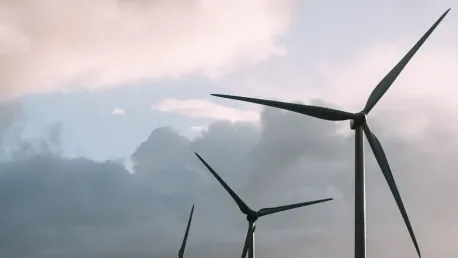The recent collaboration between Kolon Global and Hana Bank marks a significant advancement in the development of wind power in South Korea. Kolon Global has signed an agreement with Hana Bank, Hana Alternative Asset Management, and MDM Asset Management to push forward a series of wind power projects within the country. This initiative is expected to pivotally enhance the nation’s onshore wind power capacity through focused engineering, financing, and investment strategies. Kolon Global, which holds over a quarter of South Korea’s EPC contracts, will manage the engineering, procurement, and construction aspects. Meanwhile, Hana Bank will spearhead the financing and fund arrangements. The combination of expertise from Hana Alternative Asset Management and MDM Asset Management will further support the creation and investment in the respective funds. This multifaceted approach aims to fully leverage the strengths of each partner to bring about sustainable, long-term growth in the renewable energy sector.
Strategic Goals and Projected Financial Outcomes
One of the central goals of this collaboration is to significantly boost Kolon Global’s wind power dividends over the next few years. Currently, Kolon Global’s wind power dividends stand at approximately 3.5 billion won ($2.62 million) for the year 2023. However, through strategic investments and development plans, the aim is to increase these dividends to a substantial 50 billion won by 2030. Key strategies to accomplish this include the production of green hydrogen linked to wind farms, repowering aging wind farms to improve efficiency, and expanding further into the realm of offshore wind power. The anticipated surge in new projects and development funds, courtesy of this alliance, is likely to expedite the realization of these ambitious plans, catapulting Kolon Global into a prominent player in South Korea’s renewable energy market.
The focus on green hydrogen is particularly noteworthy, as it represents an innovative step forward in combining wind power with cutting-edge technology. By converting wind-generated electricity into hydrogen, Kolon Global aims to create a sustainable energy solution that can be leveraged across various industries. Additionally, repowering old wind farms will involve upgrading existing infrastructure with the latest technologies, enhancing their output and operational lifespan. This comprehensive approach not only maximizes the utility of existing assets but also paves the way for new installations. Such strategic expansions signify a holistic growth trajectory that aligns with global trends in renewable energy while ensuring significant financial returns for stakeholders involved.
Market Potential and Sustainable Development
South Korea’s growing market potential for renewable energy projects sets a strong foundation for this collaboration. Strengthening sustainable development and financial growth, the partnership between Kolon Global and Hana Bank signals a new era of energy transition. As South Korea aims to cut its carbon footprint and switch to greener energy sources, the importance of onshore and offshore wind power grows. Investments in these areas ensure that the country not only fulfills its environmental commitments but also drives economic prosperity through sustainable energy projects. The partnership’s emphasis on green hydrogen production and updating old wind farms underscores a comprehensive approach to sustainable energy.
Additionally, this sector’s expansion promises significant economic advantages, including job creation, regional growth, and technological progress. Building new wind farms and repowering existing ones will require skilled labor, creating numerous employment opportunities. The regions hosting these wind farms stand to benefit from infrastructural investments and related economic activities. The technological innovations introduced by these projects are poised to set new standards in the renewable energy sector, further positioning South Korea as a leader. The alignment of financial investment and sustainable development goals makes this collaboration a model for future renewable energy initiatives.









